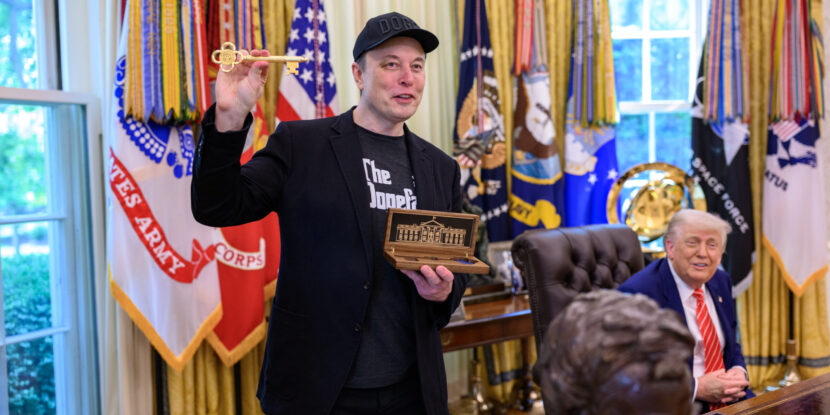
PULSE POINTS:
❓What Happened: The United Kingdom has been excluded from a U.S. executive order that doubles steel and aluminum tariffs from 25 percent to 50 percent.
👥 Who’s Involved: U.S. President Donald Trump, the British government, and U.S. firms importing steel and aluminum.
Your free, daily feed from The National Pulse.
📍 Where & When: President Trump’s executive order was signed in the U.S. on Tuesday evening, impacting international trade.
💬 Key Quote: A British government spokesman stated it remains “committed to protecting British business and jobs across key sectors, including steel as part of our plan for change.”
⚠️ Impact: British exporters avoid the immediate tariff hike, showcasing a benefit of Britain leaving the European Union (EU) and regaining control over its international trade policy. However, it faces potential increases if the terms of the U.S.-UK Economic Prosperity Deal are not met by July 9.
IN FULL:
The United Kingdom has avoided a tariff increase under a new executive order signed by U.S. President Donald J. Trump that doubles steel and aluminum import taxes for many countries. While the order raises tariffs on these materials from 25 percent to 50 percent for most nations, Britain, which regained control over international trade policy on exiting the European Union (EU), will maintain a lower rate—at least for now.
The exemption hinges on compliance with the U.S.-UK Economic Prosperity Deal (EPD), agreed between the Trump administration and the British government on May 8. According to the order, if the United Kingdom fails to meet the terms of the EPD by July 9, the tariff rate could rise to 50 percent.
The executive order, signed on Tuesday evening, aims to increase costs for U.S. firms importing steel and aluminum from abroad, bolstering the American steel industry.
The exemption for Britain provides relief for British exporters, who would otherwise face significant financial strain under the heightened tariffs.

PULSE POINTS:
❓What Happened: Elon Musk publicly criticized President Donald J. Trump’s flagship tax and spending bill, calling it a “disgusting abomination.”
👤Who’s Involved: Elon Musk, President Donald Trump, Speaker Mike Johnson, Senator Rand Paul, Senate Majority Leader John Thune, and Senator Chuck Schumer.
Your free, daily feed from The National Pulse.
🧾Key Quote: “Shame on those who voted for it,” Musk wrote on X.
⚠️Fallout: The rebuke could signal an impending rift between Musk, who recently departed the administration, seemingly on good terms, and President Trump.
📌Significance: Musk’s break with the Trump administration is his most direct since leaving government service at the end of May.
IN FULL:
Elon Musk lashed out at President Trump’s landmark tax and spending legislation on Tuesday, calling the bill a “disgusting abomination” and accusing lawmakers of saddling Americans with unsustainable debt.
Musk’s remarks came just days after his departure from the Trump administration, where he had served as the frontman for the Department of Government Efficiency (DOGE) initiative aimed at cutting government waste, with mixed results.
In posts on his X platform, Musk said the bill would raise the deficit to $2.5 trillion and was filled with “outrageous” pork-barrel provisions. “Shame on those who voted for it,” he wrote.
The bill, passed by the House in May, would extend Trump’s first-term tax cuts, cut taxes on tips, overtime, and social security, boost border security and defense spending, and raise the debt ceiling to $4 trillion. The Congressional Budget Office has estimated it would increase the deficit by at least $600 billion in the coming fiscal year.
President Trump’s Press Secretary, Karoline Leavitt, responded to Musk’s criticism by saying the America First leader “already knows where Elon Musk stood on this bill.”
Members of the administration, such as Stephen Miller, have explained to Musk that substantial cuts cannot be achieved in the “one big beautiful bill” because it is a reconciliation bill. Under the law, the reconciliation process can only impact discretionary spending. Most federal agency budgets, which Musk’s DOGE cuts impact, are considered nondiscretionary spending, and must be dealt with separately.
House Speaker Mike Johnson said he spoke with Musk about the bill for 20 minutes earlier this week and noted that its phasing out of certain tax credits may affect Musk’s Tesla company. “I just deeply regret he’s made this mistake,” Johnson said.
Senator Rand Paul of Kentucky has said he won’t support the measure if it includes raising the debt ceiling. “The GOP will own the debt once they vote for this,” Paul said.
So far, Trump has held fire against Musk, who is also avoiding attacking Trump directly, instead stressing that the bill is “Congressional.” However, Trump has fired back against Rand Paul on social media, arguing he has “very little understanding of the bill” and that “the people of Kentucky can’t stand him.”
Despite the friction, Senate Majority Leader John Thune signaled the GOP would “proceed full speed ahead.” The administration has set a July 4 deadline to pass the legislation.
READ:
I’m sorry, but I just can’t stand it anymore.
This massive, outrageous, pork-filled Congressional spending bill is a disgusting abomination.
Shame on those who voted for it: you know you did wrong. You know it.
— Elon Musk (@elonmusk) June 3, 2025
show less

 3 weeks ago
1
3 weeks ago
1








 English (US) ·
English (US) ·